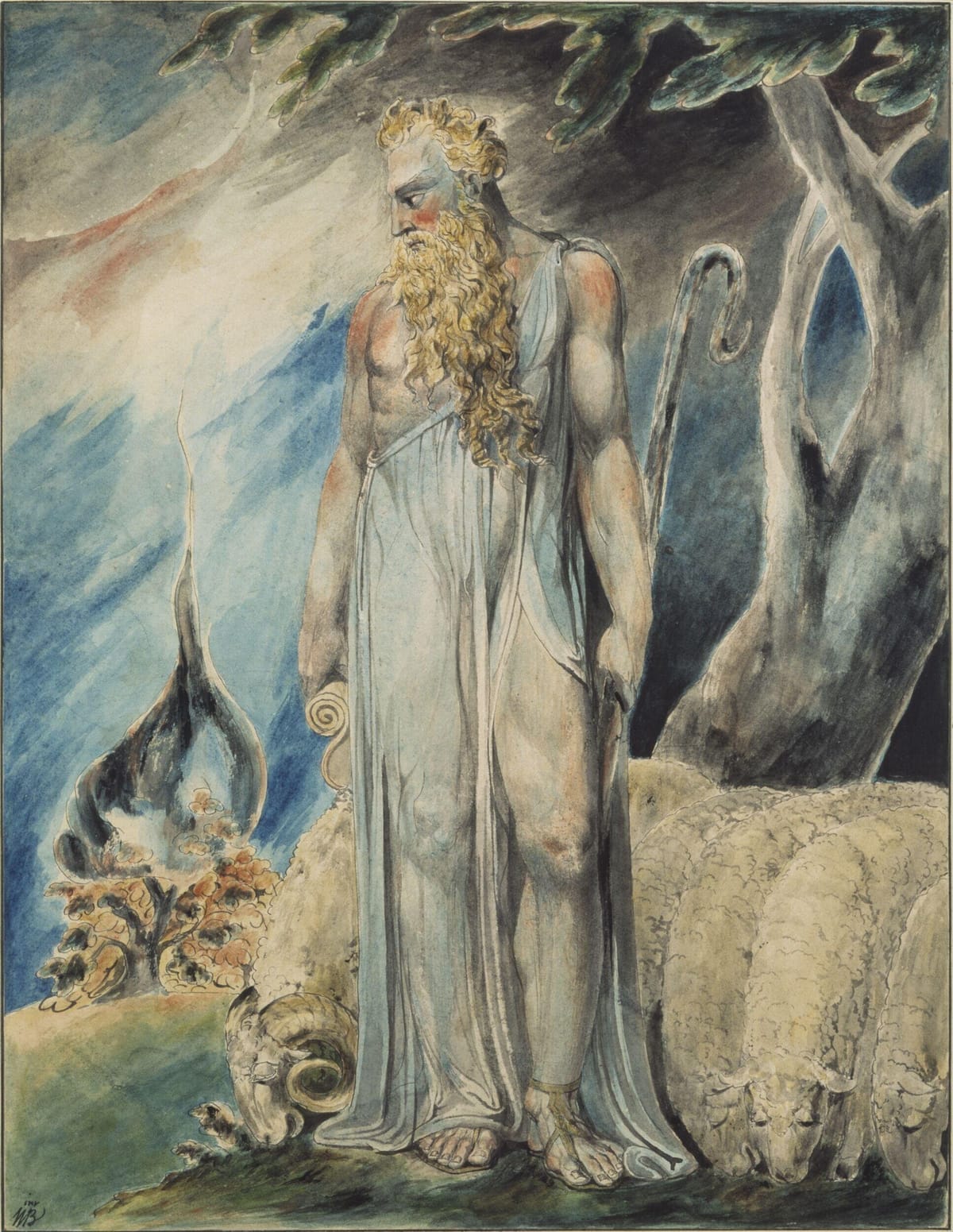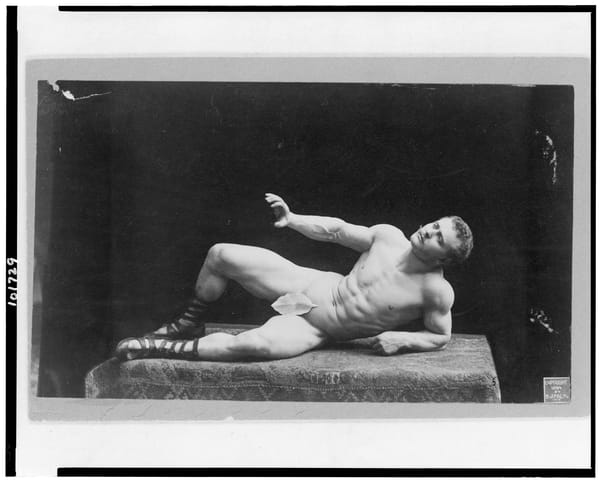Shemoys and Suffering unnoticed / שמות און לײַדן אומבאַמערקט
My atheistic crisis of faith

This is a weekly series of frum, trans, anarchist parsha dvarim. It's crucial in these times that we resist the narrative that Zionism owns or, worse, is Judaism. Our texts are rich—sometimes opaque, but absolutely teeming with wisdom and fierce debate. It's the work of each generation to extricate meaning from our cultural and religious inheritance. I aim to offer comment which is true to the source material (i.e. doesn't invert or invent meaning to make it more comfortable) and uses Torah like a light to reflect on our modern times.
Content note: Discussion of slavery, violence, xenophobia, genocide in Gaza; mentions of fires in Los Angeles, cobalt mining in the Congo, Islamophobia, Nova Festival deaths, Nazis
An appeal: My friend Manal and her family still need support buying food and paying for medical care, like everyone in Gaza still needs support. Please donate if you can.
I'm having a crisis of faith, which is a strange position to be in as an atheist. I'm davening less, and I'm increasingly less motivated to keep kashrus, to wrap tefilin, and (in my lowest moments) to keep Shabos. The reason I hold all of these ritual traditions is primarily because they are good for me, and secondarily out of obligation not to Hashem but to Yiddishkeyt. Cultural, religious, and linguistic plurality is extremely important to me: it's what makes humanity beautiful and interesting. Insisting on remembering what the Nazis tried to destroy is an act of antifascism. Ashkenazi Jewish traditions are my inheritance, my burden and my blessing. But tradition for its own sake is a repetition of biases and mistakes, and lately I'm questioning what's worth preserving.
My Jewish grandparents (b. early 1930s) would not understand my desire to be ba'al tshuva, my "return" to orthodox Judaism. They were both Reform Jews, and non-practicing ones at that. Their Jewishness was more a cultural and racial category than a religious one. I grew up in rural Colorado, 500 miles away from them with barely a dial up connection and little access to Jewish culture, or any culture. My mother also does not understand. Will my children understand? Will their children? I feel a pressure to preempt their questions about why I'm doing this—things that enrich my life but also objectively make it harder—if not out of fear of heaven.
The parsha this week is the first section of Shemoys (Exodus): the death of Yosef and his generation, and our introduction to Moishe Rebeynu and the harsh conditions of the Israelites in Mitsrayim. Paro (Pharoh) wants all Hebrew boys killed by the midwives when they are born because "the Israelite people are too numerous for us". Moishe is enslaved and kills an overseer after witnessing him abuse another slave, and flees to Midion where he helps defend the family of a priest from shepherds with unspecified malintent. It's these acts of justice, I believe, that prompt Hashem to choose Moishe as the leader, the representative of the Jews and the most favored of all people.
וַיִּשְׁמַע אֱלֹהִים אֶת־נַאֲקָתָם וַיִּזְכֹּר אֱלֹהִים אֶת־בְּרִיתוֹ אֶת־אַבְרָהָם אֶת־יִצְחָק וְאֶת־יַעֲקֹב׃
וַיַּרְא אֱלֹהִים אֶת־בְּנֵי יִשְׂרָאֵל וַיֵּדַע אֱלֹהִים׃
God heard their moaning, and God remembered the covenant with Avrohom and Yitsik and Yakov.
God looked upon the Israelites, and God took notice of them.
Shemoys 2:23–25
The people are crying out for a "long time", and eventually God hears them. Eventually God remembers the covenant. Eventually God takes notice. Does this suggest that God does not always hear, remember, or notice us in our suffering? It sure seems that way. But I never feel connected to Hashem. I'm an atheist.
This is the end of the public preview for four weeks. Sign up for $5 a month to read the full dvar.
Money shouldn't a barrier to accessing writing, art, and culture. If $5 a month isn't sustainable for you, please email me and I'll send you the link to sign up for free.
But if you can afford it, please consider signing up. This newsletter helps sustain my unpaid community work as a Jewish lay-leader and food distributor.
I believe—I understand why—we must merit Moshiakh. But I do not understand why our suffering should go unnoticed unless/until we merit divine attention. If I did believe in Hashem, I would think that people hurting each other is deeply sad and insulting to the gift of life we've been given, and that Hashem would want to do something about that, to help the righteous and punish the wicked.
Who is enslaved now? Incarcerated firefighters in Los Angeles, children cobalt miners in the Congo. Who is "too numerous" and facing state violence germane from xenophobic anxieties? Syrian refugees in Europe, migrants crossing America's southern border, Muslims. Who is killing babies now? "There are no civilians in Gaza" is a constant refrain from the IDF to justify the murder of anyone who crosses their tanks and sniper sights, including—maybe especially—kids and doctors and journalists. I don't know how long I can continue to share, to opt in, to try so hard to be in a faith community with people who support genocide.
I also don't want to cede any cultural or religious ground to Zionism. Ethnic violence is not unique to Jews, and despite what Zionists say, Zionism isn't Judaism or Jewish culture. There are more Christian Zionists in American than there are Jews in the world. But I don't like saying the same tehilim as people who gleefully watch hospitals burn, rubble crushing people, bullets shredding flesh. (Nor do I like sharing leftist spaces with people who reveled in the mass death at the Nova Festival.) "Am Israel Khai" has gone from defiant and antifascist to just fascist. I don't like davening with them, and it turns out they don't like me either: I've been kicked out of two shuls in the past three years because I have politics. I held my tongue and really tried to behave myself—that is, I behaved like a coward—and still I was kicked out.
What traditions are worth preserving? What cultural practices can I stomach sharing with war criminals? What is worth pulling out of this parsha? Maybe a Jewish mythology that valorizes bravery: doing the right thing even when it's hard. Like Moishe, we are reluctant and feel unprepared to meet the moment. We must lean on our brothers and comrades who have different skillsets. But first, we must demand attention for injustice. We must refuse to close our eyes and ears to the suffering of other people, especially at the hands of our people. If God isn't taking notice, then we must.
They asked the Baal Shem Tov, "The Talmud tells us that for everything G-d forbade, He provided us something permissible of the same sort. If so, what did He permit that corresponds to the sin of heresy?" The Baal Shem Tov replied, "Acts of kindness." Because when you see a person suffering, you don't say, "G-d runs the universe. G-d will take care. G-d knows what is best." You do everything in your power to relieve that suffering as though there is no G-d. You become a heretic in G-d's name.
— from Chabad's instagram a few days ago. The irony given Chabad's position on The War—the selective worthiness of those who suffer—is not lost on me




